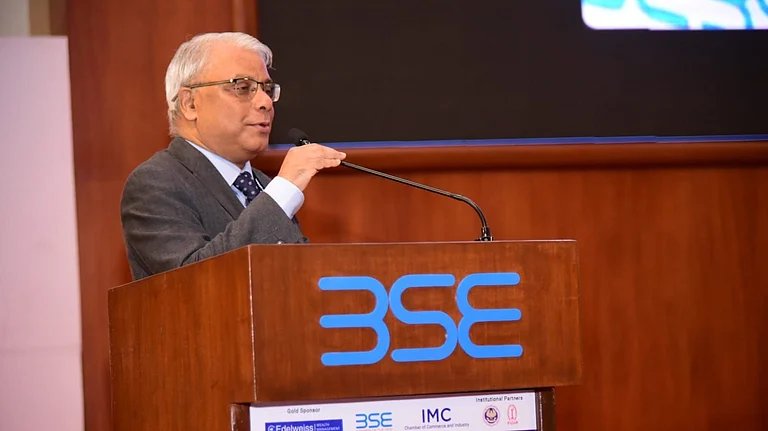More trouble seems to be brewing for the Hinduja Group-led IndusInd Bank, as reports of fresh issues in its microfinance loan portfolio have emerged. The report claimed that the private lender's ₹6,000–7,000 crore worth of loans could be under the scanner for improper lending practices.
According to Moneycontrol, the bank is under scrutiny for allegedly offering fresh small-ticket unsecured loans to cover stressed microfinance (MFI) exposures, some of which were misclassified as agriculture loans. The report, citing bank sources, said IndusInd extended new loans—often to borrowers’ spouses—to prevent existing MFI loans from turning non-performing.
These fresh loans were reportedly netted off against overdue MFI loans to avoid classifying them as defaults. The practice, flagged during an internal review around March–April, has since been stopped following an audit.
The bank has called the claims "false, inaccurate, and speculative."
"As part of its microfinance business, IndusInd Bank Limited lends only to women and not their spouses. Women are central to our microfinance business, with products designed to foster financial independence and support their entrepreneurial endeavours. The core of IndusInd Bank’s microfinance business is to provide small-value unsecured loans and other basic financial services to women, primarily located in rural India, by delivering financial services directly to doorsteps,” an IndusInd Bank spokesperson told the publication.
How the Issue Came to Light
The portal claims the practice came to light during an internal review around March–April this year. This followed the bank’s March disclosure of misaccounted trades in its derivatives portfolio. That prompted the bank to appoint PwC to review its books and Grant Thornton to conduct a forensic probe. The lapse was later estimated at around 2.27% of the bank's net worth, or roughly ₹1,960 crore.
Around the same time, the bank’s internal auditors flagged a ₹600 crore discrepancy in microfinance interest income. On April 22, The Economic Times reported that the lender had appointed EY to conduct a forensic audit to probe the discrepancy.
The Moneycontrol report does not explicitly mention whether EY uncovered the latest issue in the MFI portfolio.
Bank Gave New Loans to Borrowers' Spouse
Unlike conventional evergreening—where the same borrower receives a new loan to avoid default—this case involved a subtler practice that’s harder to detect, the report said. Since the fresh loan was often given to a borrower’s spouse, with different KYC details, linking it to the stressed microfinance (MFI) loan became difficult. According to a senior official in the industry, this method was commonly used by the bank until around July–August 2024.
For example, if an MFI borrower failed to repay a ₹20,000 loan for over 60 days, the bank would issue a fresh, higher-value loan to the spouse—typically the husband. This new loan would be used to offset the overdue MFI account, helping the bank avoid classifying it as non-performing. These were booked as small-ticket unsecured loans, and in some cases, misclassified as agriculture loans. One banker noted that such classification could benefit the bank, as agri-loans require repayment only at the end of the year, without regular instalments.
In its financial results for the fourth quarter of FY25, the joint auditors of the bank—MSKA & Associates and Chokshi & Chokshi LLP—filed a letter under Section 143(12) of the Companies Act, 2013, flagging a suspected offence involving fraud.
"The resultant findings from the investigation/review reports, in summary, revealed an involvement of senior bank officials, including former Key Management Personnel (KMP), in overriding key internal controls across the aforesaid functions/areas, and a concealment from the Board and the statutory auditors of the wrongful accounting practices adopted over such period of time, as indicated in the respective investigation/review reports," the auditors said, as per the bank’s exchange filing. However, the above issue was not mentioned in the earnings release.
Following this, in May 2025, SEBI issued an ex‑parte interim order barring five former senior executives—including CEO Sumant Kathpalia and Deputy CEO Arun Khurana—from engaging in securities transactions. SEBI also impounded ₹19.8 crore, citing their trade activity during the period when they possessed unpublished price-sensitive information (UPSI) about the financial mismatch.
The MFI segment accounts for 9% of the bank's total loans. It showed early signs of stabilisation in Q4 FY24, with disbursements rising 1.4% quarter-on-quarter, primarily in branches with strong customer profiles, low forward flows, and higher branch vintage. Portfolio quality improved across most states. However, according to Elara Securities, slippages remained elevated at 5.8% of the bank's total loans, largely due to stress in the MFI book, which contributed around 60% of the slippages.
It noted that some accounts were previously misclassified, and even after adjusting for that, MFI slippages remained high—a trend expected to continue through H1FY26. While stress was concentrated in the MFI segment this quarter, there are concerns that other parts of the loan portfolio may come under pressure in future quarters, the brokerage noted.


































